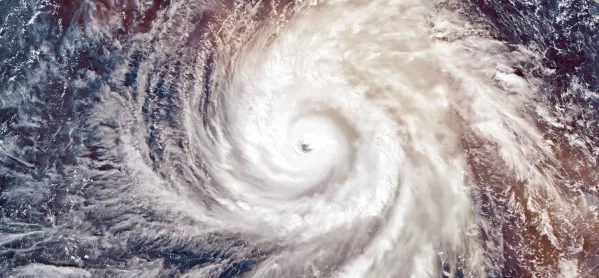In a world where climate change is never far from the news, teaching young people about humanitarian emergency responses has never been more important. The science is telling us that there’s been an increase in the number of natural disasters occurring, and the problem is likely to get worse.
Responding to emergencies is becoming an ever-larger part of our work at SCIAF (Scottish Catholic International Aid Fund). We work with people around the world who have lost everything as a result of floods, droughts, crop failure and other extreme weather events.
It’s hard for anyone who hasn’t experienced it to comprehend how truly devastating this is. But Scotland’s Curriculum for Excellence requires children to learn about natural disasters and their impact, and so we wanted to make sure we’re providing the tools to teach children about what happens in humanitarian emergencies so they can better understand the world they’re growing up in.
WATCH: Thousands join climate strikes
Climate change: Why aren’t schools doing more?
Quick read: First minister ‘heartened’ by pupils striking over climate change
It’s a serious message, and conveying it in a sensitive, understandable and appropriate way to children is challenging. But games are becoming an increasingly popular way to teach tough lessons in development education, and there are plenty of great examples out there.
Lessons on climate change
We have, therefore, created a resource for teachers, which includes two lessons taught in the classroom, followed by a visit from SCIAF with our giant board game. It’s similar to Snakes and Ladders, with pupils trying to get from primary school to secondary school by rolling a dice. When they land on a square, it’s linked to interactive photos and case studies displayed on a screen.
This means young people can put a face on some of the issues they’ve been learning about, and that’s partly what makes it so powerful. The work we do overseas allows us to collect stories of real people who have been affected by emergencies, and share them with classes, helping young people to imagine what it must be like to be in that situation.
The game has proved popular among pupils - we’ve seen classes chanting and cheering on each other’s progress, while others have desperately wanted to play again. But perhaps the most powerful lessons have been learned by the pupils who watched classmates charge ahead while their own progress was hindered.
One boy landed on the “failed crops” square twice in a row and was visibly frustrated as he fell behind. It hammered home the lesson that children around the world are prevented from doing simple things like going to school through no fault of their own - it’s just the circumstances they find themselves in. It’s not fair but that’s the reality of the situation for many of those we work with.
In the years to come, young people will have to deal with the consequences of the changing climate. Therefore, it’s crucial that we ensure pupils understand how people around the world are affected by emergencies and natural disasters - and what they can do to help.
Elaine McGinlay is a development education officer at the Scottish Catholic International Aid Fund (SCIAF)


